The Kingdom of Back Read online
Page 11
“Yes, Papa,” I replied. If he was upset enough to raise his voice at my mother, then I did not dare add to it. Alone. It was a frightening thought, performing without my brother. But somewhere deep inside me, a voice also stirred to life.
The attention will be yours alone.
I joined Mama in Woferl’s bedchamber, for I could not sleep either, and watched my brother toss and turn with fever. When she would at last fall asleep in exhaustion and Woferl would wake up, I would hold his hand and tell him more stories to keep him from crying.
Finally, one night, my mother and father left to seek out a doctor for help. I alone remained beside Woferl, turning my pendant in my hand as if to give my brother good fortune.
When he woke to see me at his side, he squinted and began to cry. “My skin burns, Nannerl,” he murmured. His hands reached up to scratch, but I forced them back down. He protested weakly. “My knees and elbows hurt.”
His joints were swollen. I could see the rounded look of them. It was such a pitiful sight that I squeezed his hand and tried to give him a smile. “It will all pass soon,” I reassured him as I wiped his tears away. “And you’ll be back in front of your clavier. I promise.”
He looked away and toward the window. “Do you think Hyacinth is watching us right now?” Woferl asked.
Hyacinth again. I felt a chill. Why was he in Woferl’s thoughts so much these days? I tried to think back to the dream I’d once had. The night flower. The witch. Hadn’t Hyacinth given Woferl something? The scar on his thumb had finally faded, but I found myself touching the spot where it had been, trying to remember. The back of my neck prickled, as if someone else might be in the room with us.
Did Hyacinth know that Woferl would fall ill? The thought so unsettled me that I immediately dismissed it.
It was possible, I suppose. But perhaps, more likely, Woferl’s fever had been brought on by wind and rain.
“I don’t know,” I finally said to my brother. He turned toward me, eager to be distracted, and I obliged. “Maybe he is sitting somewhere in the kingdom’s forests right now, perched high on the roots of a tree, watching us through a round mirror.”
“Do you think he is sad, like me?” Woferl said.
“Very sad,” I replied, and reached out to stroke his damp hair. “When Hyacinth weeps, his tears form puddles at the bottom of the trees. This is how the drowning pools form.”
“Maybe he isn’t in the forest anymore,” Woferl said, “but going somewhere else that we haven’t seen. A castle in the hills.” He burst into a fit of coughs that brought tears to his eyes.
“Yes, a castle in the hills,” I said. “Perhaps this was his old home, the palace where the princeling once lived.”
Woferl nodded, grumpy. “What happened to him? It must have been very tragic.”
Tragic. Woferl’s words reminded me of the look I’d seen on Hyacinth’s face in the trinket shop’s grotto, a moment of sadness that was there and then gone. What had happened to the princeling in his past?
“There is a river that surrounds all sides of the hill,” I went on as I pondered, “and the grass at the very bottom near the water is lush and green, but the grass higher up is dry and dying, for it hasn’t rained in months. Hyacinth has to swim across the river to reach the castle, but because he cannot swim, he can only sit on the banks and yearn for his lost home.”
“Why do you think he left?” Woferl whispered.
I thought of little Hansel and Gretel abandoned in the woods, stumbling across the witch’s house of gingerbread. I thought of the smith of Oberarl, offering his daughter to the devil in exchange for the healing waters of the Gastein Valley. The faery tales swirled in my mind as I tried to think of what Hyacinth’s history might be.
Finally, something came to me. I looked at Woferl. My story came out hushed, dark as the shadows flickering in the corners of the room.
“The castle is crumbling now, for no one has been there in a long time. Years ago, a young king named Giovanni ruled the land with his beautiful queen, whom he loved dearly. In fact, everyone loved the queen, even the great Sun, who bestowed his golden magic of fire unto her so that the land flourished under her warmth. The light and the heat restricted the land’s faery creatures to the woods, where their dangerous magic could not harm the kingdom. All was well for many years. When the queen finally announced that she would have her first child, the people rejoiced and counted themselves very lucky indeed. Everyone waited eagerly for the birth.”
As I spoke, Woferl grew quiet, his aches momentarily forgotten, so that the only sound in the room became that of my voice.
“But the queen fell ill when the first snows arrived that winter. Her rosy cheeks drained of color, and her shining hair became dark and limp and damp from her lingering fever. The king’s doctors would boil their medicines and feed her teas made from strange, exotic roots. The queen began having terrible nightmares. During the day, she saw visions of death and suffering, and at night, she witnessed strange dark figures glide past her windows and her bed. She grew paler, even as her unborn child swelled in her belly.”
The story unfolded and my voice began to change. It became wilder and deeper, as if it belonged to another. The words did not quite match with the movements I made with my lips. A strange fog in my head left me feeling distant. The candle burned lower. From the corner of my eye, I could see a shadow at the edge of the room growing, until it looked as slender and graceful as the dancing shape of a princeling.
“The queen gave birth to twins, a boy and a girl, in the spring of that year. Although ravaged by illness, she did not die, but sank deep into a permanent madness. Frightened for her, the king assigned his champion to her side in an attempt to keep her safe. But it did no good. She rose one morning, took her baby boy in her arms, and walked out into the forest, murmuring about the faeries calling for her in the woods.”
“What happened to them?” Woferl whispered.
“I don’t know,” I replied, but through the fog in my mind, I could hear someone else continue the story, as if the answer had existed all along. “The faeries are always looking for something to devour. They find the sadness in souls particularly enticing, and when they happen upon them, they will do whatever they can to get it.”
Woferl looked grave. “Then they must certainly have taken her,” he said.
I shivered at the finality in his words as I went on. “When the queen and her son did not return, the entire kingdom went to search for the pair. No one ever found them. The grieving king lost all will to live, leaving his castle unguarded and untended, so that it began to crumble from disrepair. He ordered his daughter locked away in the tallest tower of the castle, so that the faeries could not steal her away too. He lost his memory over time. He forgot his wife and his two children. The Sun, devastated by the young queen’s disappearance, abandoned the kingdom and plunged the land into eternal night. The crops withered. When the king finally died, the people fled the land until the castle stood empty and alone.”
“What about the princess?”
“No one knows, although some say that she is still locked away in the castle’s highest tower, waiting for someone to remember her.” My words seemed so true in this moment that I found myself thinking of the faery witch trapped in the cove. She had told me how lonely she was too.
Woferl sighed deeply and sank his head into the bed’s pillows. “Hyacinth is the son who disappeared,” he added. “He comes back to the edge of the river every morning and every evening to stare at the castle. But he can never reach it. He cannot swim.”
He cannot swim. Suddenly, I remembered Hyacinth telling me this in my dream of the night flower. Woferl, instinctively, knew this too.
I hesitated for a moment, surprised at where the story ended. In the corners of the room, the shadow that had been a princeling now faded to a flicker. I could still taste the wind of his voice on my tongue, as if he ha
d told his story through me. For the first time, I thought I understood why Hyacinth had chosen to become my guardian.
He had been abandoned too, left behind like I feared I might someday be, forever yearning for a world to which he cannot return.
“That is what happens to children who are forgotten, Woferl,” I ended, leaning over to kiss his forehead. I was exhausted now, and the castle had suddenly become too real in my mind. When I looked down at my brother, I saw that he had fallen mercifully back to sleep. “They stay forever trapped,” I murmured to myself, “nothing but a lost memory.”
* * *
Woferl’s doctor, a man named Herr Anton von Bernhard, came late that night in a quiet flurry to stir a cup of medicine for my brother.
He looked at Woferl’s eyes, listened to his heart and his lungs, and studied the angry rash on his skin. In the candlelight, I could see Mama’s face. She wanted to say something, perhaps ask Herr von Bernhard a few questions, but each time she looked at Woferl she closed her mouth, as if she’d forgotten what she had to say.
“Scarlet fever, I imagine,” Herr von Bernhard told my father afterward. “See the bright red color of his tongue. Keep him in bed, and in a room with fewer windows.” He rubbed his temples as if it were a nervous habit. “I will come again tomorrow and give him a dose of angelica. He should drink warm water, boiled thoroughly.”
We moved Woferl into a smaller chamber the very next morning, one with only a single window and dim light. Each evening Herr von Bernhard came to give him medicine, and each morning Sebastian would open the window briefly to let the sick air out. Sometimes Mama would sit with Woferl while I retreated to play the clavier, Papa at my side, absently correcting my mistakes.
The halt to our performances stretched on. Papa’s bright mood from our successful Vienna trip darkened. I performed alone before the Elector of Bavaria. Without my brother, the court’s attention stayed only on me, and when they burst into applause at the end of my performance, I felt so stunned that for a moment I forgot to curtsy in return. The tips of my fingers still tingled from the thrill of my music.
My eyes went automatically to the space beside Papa, where Woferl would be. But only a court official stood in his place. Behind him, I thought I saw a pale, lithe figure stride through the crowd, his blue eyes fixed on me in approval. I turned my gaze back down to the floor. The thought of my brother lying stricken in bed clashed with the sound of thunderous applause.
“Nannerl, listen to what the newspaper says,” my father said several nights later, as we sat for supper. “The girl played the most difficult sonatas and concertos quite accurately, and in the best of taste.” He smiled at me. This was such a rare sight that I did not react quickly enough to smile back. My heart soared. “They do not say this lightly, Nannerl. Well done.”
A newspaper article! Papa had praised me for it! I reread it in bed that night, going over the words until I fell asleep with it still clutched in my hands. In my dreams, I curtsied before an applauding opera house covered in night flowers. My mother and father sat in the front row. My brother was nowhere to be seen. Up in the balconies, Hyacinth leaned against the banisters and watched me with a look of pride.
I shook awake, my eyes still turned up in his direction.
But Woferl stayed ill. My enthusiasm dampened every time I passed his room and saw him delirious with fever in his bed. Papa muttered frequently under his breath. Sometimes I heard him speak harshly to my mother in the next room, then lower his voice in apology.
“Your father is simply frightened, Nannerl,” Mama would say when I asked her about it. “He loves Woferl dearly, and he worries for us.”
“You worry for us,” I replied, “and you never speak harshly.”
Mama smiled a little. “I am your mother, darling. What good would that do?”
One night, when both of my parents sat by Woferl’s bed with me, I saw something stir in the corners of the room. The shadow flickered, turning sharper and sharper, until finally it materialized into the shape of Hyacinth.
He had grown taller and more slender since I last saw him, matching me in height and paleness, as if he too were edging out of his youth, growing from boyhood and into the body of a young man. As I watched him, he came to kneel beside me. His eyes, serious and silent, lingered on my brother.
“I know what you are thinking, Fräulein,” he said to me. “You think that perhaps I did this to him when he pricked his finger on the night flower.”
“Did you?” I finally asked.
“Your brother pricked his finger only so that a drop of his blood could spill inside the kingdom,” he replied. “I wanted to be sure that I had a link to his lifeblood and his talent, just as I have a link to yours through your notebook.”
The thought of Woferl’s blood being his link to the kingdom sent a shiver tingling through me. “What will happen the next time we step into the kingdom?” I said. “What other dangers will we have to face? Will the kingdom require more of our blood?”
Hyacinth shook his head. “The next time you come, you will come alone. I only need you for your next task.”
“Why is that?” I asked.
“Because, Fräulein.” Hyacinth looked at me, his eyes pulsing in the dark. “The fulfillment of your wish has always been about you.”
Me. I remembered my name printed alone in the newspaper article, my father’s praise only for me. It had all happened after fetching the night flower for Hyacinth.
When I didn’t answer, Hyacinth turned his attention back to Woferl and heaved a wistful sigh. “Poor little boy,” he said. “Look at the color of his face, as if he is hovering between two worlds.”
Two worlds, the kingdom and ours. In his musical voice was such a sound of pining that I felt truly sorry for him. I thought of his past that I’d told Woferl, the way the kingdom’s forests had claimed him along with the queen, and wondered if he missed the home that he had been stolen from. Perhaps this was why he’d chosen to help me. One forgotten child to another.
“What will my next task be, then?” I asked, looking again at him—
—but Hyacinth had disappeared as quickly as he’d come, leaving nothing but emptiness beside me.
I blinked, disoriented to be alone all of a sudden. Beside me, Papa and Mama looked undisturbed, their heads still bowed in prayer.
I waited, half expecting Hyacinth to appear again. Had he ever been in here? The air seemed chillier now, and when I glanced outside the window, I noticed a ghostlike figure shrouded in dark colors drift by.
Hadn’t the queen from the Kingdom of Back seen those figures too, floating shadows in the mist, the pieces of her dreams? Hadn’t they surrounded the castle on the hill and reached for her as she lay ill?
I trembled as another glided by, then another. Now their shapes condensed, turned solid, so that I could make out their red eyes and black hoods, their twisted fingers on long, spindled hands. They grew as the candle burned low by Woferl’s bedstand.
The queen had not recovered from her nightmares, and instead had fallen into madness. I pictured her in my mind again, afraid and alone, lost in a world that those around her could not see. Perhaps they had frightened Hyacinth away too.
I rose from my place and left the room, returning with two more candles. I replaced the dying one, then set another right beside it. Mama watched me silently.
“It is too dark in here,” I said to her. “Now it is better.”
The figures outside the window slowly faded away in the brighter light, until they looked like nothing more than the flag that flapped against the glass.
A FAMILY OF DIGNIFIED REPUTATION
My brother remained weak with fever for several more weeks, catching a second illness before he finally began to recover.
He had now been absent from the clavier for nearly two months. I had not written any music during this time, either, as I would n
ot have been able to explain the quill and ink sitting beside the clavier stand. Instead, I spent the months practicing, while the unwritten notes ached in my mind, hungering for paper to rest on.
Momentum, once slowed, was difficult to pick up again. Our invitations dwindled. I still played alone before my smaller audiences. I still relished knowing that the applause was for me. But newspaper headlines were not the same as gifts of coin. My performances did not draw the kind of patrons we needed, their pockets lined with gold.
Papa began to speak more and more about money, sometimes about nothing else. Even I had already learned that three hundred and fifty gulden a year as the vice-kapellmeister of Salzburg’s court was no large sum. We could earn more with one night’s worth of performances.
“A pittance,” Papa complained, “for such a position. There is no respect for the creation of music anymore, and certainly not by the archbishop.”
“We could dismiss Sebastian for a time,” my mother suggested in a quiet voice, so that Sebastian would not hear it from where he was tidying their bedchamber.
Papa made an irritated sound. “The Mozarts and their famed children, unable to keep a manservant? Imagine inviting a member of the court to our home, only to have my own wife serving him tea and cake. Who will send us invitations, then?” He waved a hand in the air. “No, no, I will arrange for their portraits to be done.”
“A portrait each?” My mother’s eyes flickered, and I could see her doing the calculation of the cost in her mind. “Leopold—”
“What’s the matter? Are we not a family of dignified reputation? Do our children not deserve the best? Let our guests see how fine and young they both are, how well we are doing. Do you want to be the laughingstock of Salzburg, Anna?”
My mother pressed her hands tidily into her lap, in the way she always did when she knew she could not bend my father’s ear. I thought of her asking me what good it would do for her to speak harshly. “Of course not,” she said in an even tone.

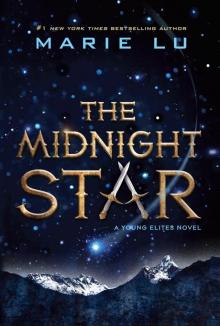 The Midnight Star
The Midnight Star Legend
Legend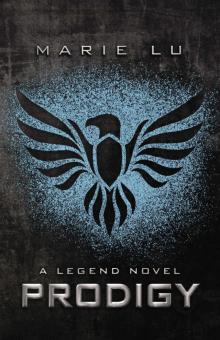 Prodigy
Prodigy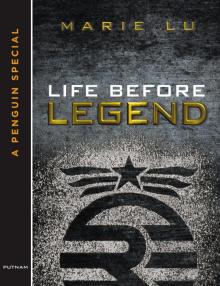 Life Before Legend
Life Before Legend Legend Trilogy Boxed Set
Legend Trilogy Boxed Set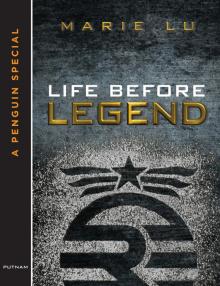 Life Before Legend: Stories of the Criminal and the Prodigy
Life Before Legend: Stories of the Criminal and the Prodigy Wildcard
Wildcard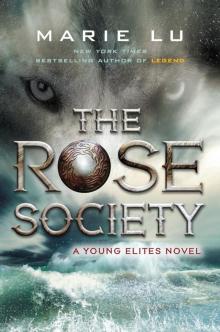 The Rose Society
The Rose Society Warcross
Warcross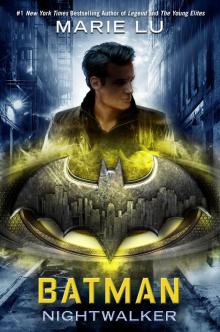 Batman: Nightwalker
Batman: Nightwalker Skyhunter
Skyhunter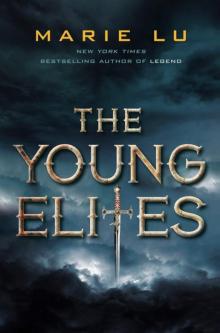 The Young Elites
The Young Elites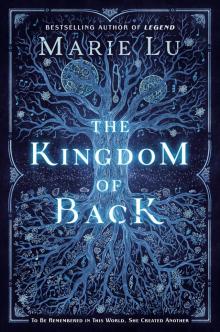 The Kingdom of Back
The Kingdom of Back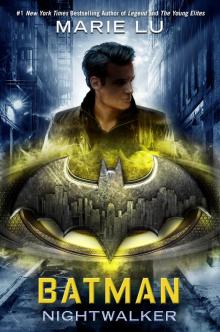 Batman
Batman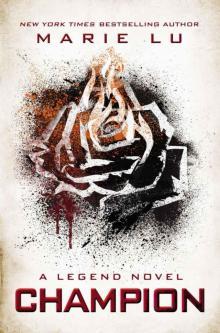 Champion: A Legend Novel
Champion: A Legend Novel Wildcard (Warcross)
Wildcard (Warcross)